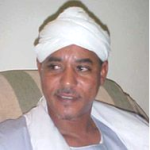INTERVIEW-Sudan tribal head says followed orders in Darfur
By Nima Elbagir
KHARTOUM, Feb 20 (Reuters) – An Arab tribal chief suspected of human rights abuses in Darfur said on Sunday he was doing only what the government told him when he recruited militiamen to help put down an uprising there.

|
|
Musa Hilal, head of the largest Arab tribe in North Darfur, top list of suspected leaders of the Janjaweed. |
Musa Hilal, who tops the U.S. State Department’s list of Darfur human rights abuse suspects, said Khartoum had entrusted tribal leaders with recruiting young men to join the militias in Darfur. “The war in Darfur was not in our hands. The decision to make war was taken by higher powers in the state.
“We, the leaders of the tribes, Arabs and others, were charged by the government to take part in the conscription effort and we only obeyed,” he said.
Darfur rebels and human rights groups have accused Khartoum of using the Arab militia, known as Janjaweed, as a proxy force to crush a rebellion in the dry western region, where at least two million people have been displaced in two years of violence.
They say the Janjaweed, whom the government calls outlaws, have conducted a campaign of rape and village burning. The government says it recruited militias to fight the rebellion but denies using the Janjaweed.
A U.N.-appointed panel has drawn up a confidential list of 51 people suspected of “heinous crimes” in Darfur and has recommended they be tried at the new International Criminal Court (ICC). U.N. sources say Hilal is on the list.
Hilal said he would not agree to the “humiliation” of being prosecuted abroad.
“As an individual who is independent and has a sense of his own freedom in his own country, I do not accept that I be prosecuted outside of Sudan. I reject it completely,” he said.
The U.N.-appointed panel last month gave U.N. Secretary-General Kofi Annan its list of suspects and evidence of killings, pillaging and rape in Darfur, where at least 70,000 people have died since March.
“I have my doubts about the international community’s agenda towards Sudan, both as an Islamic country and as a Third World country,” Hilal said.
After years of tribal conflict over scarce resources, Darfur rebels took up arms in February 2003, accusing Khartoum of neglect and giving preferential treatment to Arab tribes.
The U.N. Security Council is split on where to try war crime cases from Darfur. Twelve of the 15 Security Council members said on Thursday they favoured sending Darfur war crime suspects to the ICC, which the U.S. administration opposes.
Washington fears the court could bring politically motivated prosecutions against Americans abroad. It wants a new court for Sudan to be convened in Arusha, Tanzania, using facilities of the 1994 Rwanda genocide tribunal.
